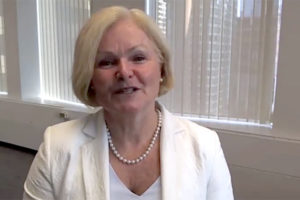
Beverley Orser, MD, PhD, FRCPC, FRSC
In yesterday’s John W. Severinghaus Lecture on Translational Science, Beverley Orser, MD, PhD, FRCPC, FRSC, of the University of Toronto, encouraged anesthesiologists to reset their sights on long-term outcomes.
It’s her answer to the question of how we, as anesthesiologists, can achieve our full potential.
“We must continue to provide excellent acute perioperative care, but also understand and mitigate the long-term consequences of surgery, inflammation, and exposure to analgesic drugs,” Dr. Orser said. “We must extend our horizons beyond the immediate perioperative period and consider the patient’s emotional, cognitive, and physical long-term well-being.”
Anesthesiologists, she said, must consider what happens to a patient after they leave the OR, trauma bay, or ICU. In doing so, she encouraged the audience to embrace a culture of “relentless innovation” and welcome the changes, including uncomfortable scientific truths and disruptive technologies, which will be required to improve patient care.
In her own Orser Laboratory, she is working to address neurocognitive disorders, which are among the most common postoperative complications but should be viewed as preventable and treatable rather than inevitable.
Neurocognitive disorders occur in 70% of ICU survivors of sepsis who have chronic critical illness and are associated not only with loss of independence for the patient and increased mortality, but also an enormous price tag. The estimated cost of delirium alone to a single institution, Dr. Orser said, is $17 million.
She said anesthesiologists must ask themselves if anesthetic drugs contribute to long-term deficits in brain function and, if so, can these deficits be prevented or reversed? Orser Laboratory has found that, yes, a single, brief exposure to an anesthetic drug can alter brain function – and drugs that inhibit the a5-GABA A receptor could be critical.
Research shows that memory deficits induced by inflammation are regulated by a5-GABA A receptors, and Orser Laboratory is working to prove that reducing the expression of these receptors with drugs like dexmedetomidine may reduce the risk of delirium postoperatively.
The overexpression of these receptors may also be linked to traumatic brain injury, early dementia, sepsis, and stroke, said Dr. Orser. And while the studies are young and more work is needed, it’s a big step in improving future patient outcomes.
Dr. Orser encouraged attendees to come together to support organizations like ASA that play an important role in translating research into practice – all in the name of establishing a culture of relentless innovation.
Return to Index